A new group calling itself the Just Crossing Alliance announced its formation today to push the Interstate Bridge Replacement project in a climate-centric direction and to ensure that the project centers environmental justice.
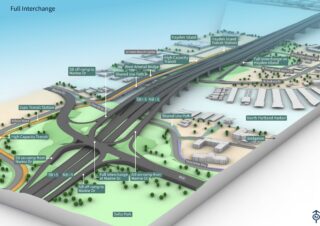
The four founding members of the coalition come from both sides of the state lines and include Front and Centered, 1000 Friends of Oregon, the Disability Mobility Initiative, and The Street Trust. Other partners who endorse the effort include No More Freeways, Sierra Club, Portland Audubon Society and several others. The coalition is coming together around a set of shared values around how they are approaching the multi-billion-dollar megaproject.
“The Just Crossing Alliance’s advocacy around the proposed Interstate Bridge crossing is driven by an urgent need to mitigate and adapt to climate change, by strong values of environmental justice, environmental protection and social justice and by the need to balance the fiscal needs of many different transportation and other infrastructure priorities in our region,” the alliance’s website reads.
The coalition follows pushing over the past year or so from many of the same groups to ensure that the IBR is “right sized”. In November, a number of the same groups sent a letter to the IBR project team with a number of requests that they saw as central to ensuring that the bridge is “climate forward”. “The IBR must not expand the number of vehicle travel lanes, including auxiliary lanes,” it wrote.
Advertisement
The group sees the issue of road pricing, or tolls, as being a central guiding principle in what the highway will look like.
Missing from the coalition represented in that letter was a heavy Washington presence, now included in the Just Crossing Alliance in the form of Front and Centered, which describes itself as a “diverse and powerful coalition of communities of color-led groups across Washington State whose missions and work come together at the intersection of equity, environmental and climate justice”, and the Disability Mobility Initiative, a statewide advocacy group that raises awareness of the limits society puts on people who don’t drive and pushes for change. Those two organizations have been pushing to change the Washington State legislature’s priorities around transportation, and in the 2022 session they saw success with the passage of a transportation package that allocated more funding to walking, biking, and transit than any previous one in state history.
“Some communities in Washington and Oregon pay the highest price for our failure to move away from autos and oil,” Front and Centered said as an organization in the alliance’s formation announcement. “The expansion of the Columbia River Crossing will create more pollution and health harm to four of the areas with the highest Environmental Health Disparities in Washington state. Washington and Oregon States have a responsibility to reduce the existing impact on these overburdened communities. The bridge expansion proposed moves us in the wrong direction.”
Advertisement
According to the shared values outlined on their website, the group sees the issue of road pricing, or tolls, as being a central guiding principle in what the highway will look like. “The design of the project should be determined by the level of demand that would occur after pricing is implemented, and not an un-priced roadway,” the coalition’s website states. “Pricing should be implemented prior to any commitment to increase capacity.” Decisions around usage fees have been framed by the project team as occurring after project designs are selected, despite elected officials like Commissioner Jo Ann Hardesty wanting to address issues like how low income drivers will be impacted by tolls up front.
“What we’re trying to do more than anything is making sure that leaders are asking questions necessary to ensure that the Columbia River Crossing [project] doesn’t repeat itself”, Brett Morgan, Transportation and Metro Policy Manager of 1000 Friends of Oregon told me. Morgan said they don’t have a formal coalition leader right now, with decisions on how to move forward being made collaboratively.
As to why the coalition is being announced now, Morgan pointed to pivotal votes coming up at the City of Portland and Vancouver, TriMet, C-TRAN and Metro to endorse a “modified Locally Preferred Alternative”, which will likely lock in a lot of decisions around the project’s design. “We are really in the heart of the important decision making,” he said. A desire to move quickly with the design process so that construction can start in 2025 has led to a timeline many elected officials have expressed frustration with. In seeking a seat at the table, the Just Crossing Alliance is attempting to ensure that the speed up timeline doesn’t leave anyone behind.



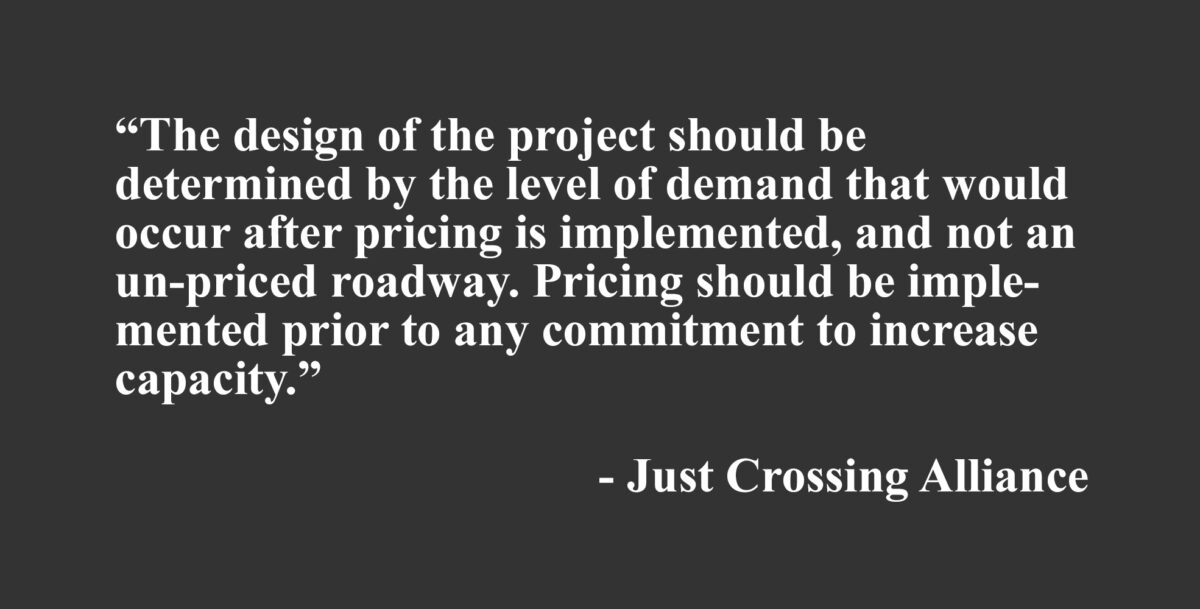

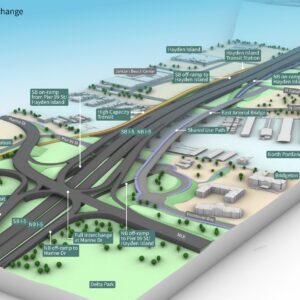
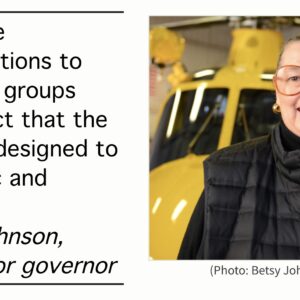
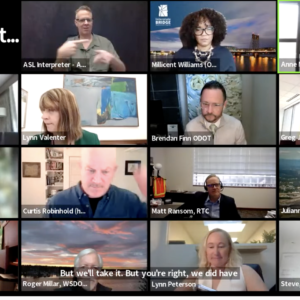

Thanks for reading.
BikePortland has served this community with independent community journalism since 2005. We rely on subscriptions from readers like you to survive. Your financial support is vital in keeping this valuable resource alive and well.
Please subscribe today to strengthen and expand our work.
Silliness. The population will only grow. We need to plan for the future.
let’s plan for the future by investing in low-carbon transportation options and those that allow us to move a larger number of people, like transit instead of freeway lanes?
Still need a new bridge for people, freight and transit
the Just Crossing Alliance isn’t opposed to new bridge, if it is designed to maximize movement of people instead of cars and prioritizes lowering carbon emissions and improving equitable outcomes. That’s literally on the website of the org – go check it out!
LOL. I can’t tell if you really believe this or not. Oh yes, because they say something, it means it really is true. Just like No Child Left Behind act lol. There is literally a group called “no More Freeways”. They have zero interest in making things better, they just hate cars.
When every action people like you and organizations like these is about making lives of those who have no other option miserable, words like yours ring very hallow. There are no other options. Maybe instead focus on more public transportation and stop also pushing bicycles as a savior. Bicycles are great, but they are not a solution at all in Portland. They can be a small part of many solutions, sure. But many bicyclists hate cars and sign off on anything that hurts drivers.
I am tired of justice and equitable at this point. Way to make people start rolling their eyes by overusing the terms every turn for many terribly executed ideas (like awarding millions of dollars to a felon that swindled another city, because of their skin color only). These radicals have not improved anything for minorities but just annoyed people and will most likely cause Portland and Oregon to shift right dramatically. I am not voting for progressives until they stop catering to the most radical and loud groups and actually create good solutions for people.
There is a reason Kotek is trailing in polls, in Oregon.
Aaron, people like you do not care about justice and climate change etc. You hate cars, and anything to stick it to drivers is something you will support. The policies of peopel like you have caused more deaths, more air pollution and more partisanship.
Like it or not, bicyclists are getting fewer and more people are driving. Either come up with solutions or just do not get in the way of things like this bridge.
Portland has tried that for 50 years and is now seeing that it doesn’t work, hence this bridge expansion
LOL, right. Please show me those 50-year-old transit bridges in Portland.
lol – instead can I show you how the radicals and anti-car people’s efforts caused more air pollution, deaths and less bicycle ridership because they do not care about any improvement, they just care about causing drivers more pain.
The radical bicyclists act in a way similar to trump fans – they do not care if something improves the causes they say they believe in as long as they can stick it to other side.
I would LOVE to not drive. But it takes me over 2.5 hours to get to work with bus, sitting next to drug addicts and mentally unstable people because the virtue signaling crowd deemed security on public transport to be discriminatory. In the last decade, there has not been much in terms of giving people options, but many that took away lanes and caused traffic to be far worse.
There’s a narrative that the 3-lane bridge is a bottleneck constraining freight, commuters and border-to-border traffic, and therefore must be widened.
I don’t drive every day but I’ve driven over the Columbia River bridge many times, including N bound at rush hour. What I perceive is that on the bridge, in the ‘neck’ of the bottle, traffic actually speeds up, spaces appear between vehicles, and even drivers of long freight trucks can move to the lane they need. Anyone who is in Portland (and has a motor vehicle) can observe this for themself.
The problem is not the namber of lanes on the bridge and widening the bridge won’t fix it.
the problem is that we are not investing in such options and all we are doing is causing more and more gridlock and people being stuck in traffic. Progressives in Portland are amazing at punitive measures but not so much in actual ideas that will get people off their cars. Why do people think that despite making traffic and parking horrible by design, people still stay in their cars?
Progressives in Portland are the main reason people do not switch and will also vote against them. They ruin the lives of many people with these punitive measures – making traffic terrible, taking lanes away from busy and already congested areas (but only in the East side, wonder why lol), hurting people who are single parents, disabled, poor etc the most.
I can’t wait to vote against every progressive this year. I have voted progressive all my life and I have never seen such incompetent, spiteful group as this years. Virtue signaling galore, but no actual solutions.
Sorry but if you want people of their vehicles, and not just acting because you hate cars, you need to provide alternatives. Pretty much NOBODY who has a regular job will bike miles and miles ind downpour with two kids and have to go to work as well.
Cars are here to stay until we provide alternatives. People who remove lanes, who oppose this bridge etc are just spiteful people because all they want to do is hurt people who have no options.
Stop virtue signaling, start creating solutions if you want change.
We can move a lot more people, if we decrease the excessive number of cars clogging up our transportation system.
On what? Bicycles? Seriously? Creating more bottle necks is part of the road diet agenda. It does NOTHING to get people of their cars because there are not viable alternatives. Create alternatives, then create a road diet. Otherwise it hurts the most vulnerable populations the most and just causes more and more resentment. Everytime I drive on Hawthorne, I remind myself never to vote for progressives again. Traffic is horrendous there now, and apparently making cars idle in traffic helps air quality?
Highway engineers are planning for the past, not future.
Maybe it is because the future you have shown them is far worse than what we have? Just look at Glisan,m Burnside, Stark, Hawthorne, MLK – all part of that “futuristic” planning. The main premise of your “future” is to make driving painful so people will stop driving. Except, the anti-car people just hate cars, they actually have no solutions. So we end up with far worse traffic and nobody switching to alternatives (because they do not exist in a meaningful way).
I am a huge fan of public transportation, used it all my life before moving here, and we really need to work hard to stop climate change, but anti-car people do nto make it easy because they really do not care about these ideas, they just want to stick it to drivers.
We need to create moire lanes, remove the bicycle lanes on the east side since nobody uses them, and we can reintroduce those after we actually gave people OPTIONS.
When you say “we need to plan for the future,” what do you mean?
This organization has my trust. Get it!
Not mine.
“1000 Friends for Oregon” is a profoundly regressive lobbying corporation funded by a dark money “think tank” created by Clyde Holland. Holland is a Trump-donating real estate mogul who has bankrolled some of the most extreme right-wing candidates in the PNW.
https://www.upforgrowth.org/growth-members
https://www.upforgrowth.org/person/clyde-holland
https://www.nwprogressive.org/weblog/2016/08/three-of-tim-eymans-wealthiest-benefactors-are-hosting-a-fundraiser-for-donald-trump.html
https://www.seattletimes.com/seattle-news/politics/2-wealthy-donors-pour-cash-into-state-republican-races/
This is so laughable. What’s regressive about 1000 Friends of Oregon? They’ve been leaders on equity issues for three decades.
And they’re not (primarily) a lobbying corporation. They’re a nonprofit co-founded by Tom McCall. They’re limited by their tax status to spend no more than 20% of their resources on lobbying.
Yes, some people who build housing support organizations that support building housing. The politics of housing are a fascinating mix. And taking money from people who might otherwise give it to Donald Trump to do good things is a good thing.
Not it’s not.
Moving the Overton window (triangulation) towards an even more capitalist and dehumanizing housing system is the raison d’etre of corporatist “non-profits” like 1000 Friends of Oregon
If only folks of a very specific political persuasion can be trusted, how do you envision achieving progress on the issues you care about? Is any progress possible, absent total revolution?
There is clearly only one solution, Comrade.
so you couldn’t answer his points and decided to be rude and personally go after him. Tell me how unlike trump supporters you are?
Multiple European nations are progressing* without a dictatorship of the proleteriat. So…NO.
The subtext of your comment is also that there has been essentially no progress in corporatist Oregon (or in the USA).
*too slowly but it matters
Prioritizing the ideological purity of would-be allies over the opportunity to build momentum for concrete wins is a solipsistic impulse to which ideologues are frustratingly prone.
concrete wins, what a funny thing to say lol. Stopping this bridge will only increase idling cars, traffic and will cause people to vote against your causes.
Why are bicyclists so much keener on hurting drivers and making their lives miserable instead of actually coming up with solutions.
FACE IT. People do not want to bicycle all the time. it rains here 10 months a year. We have terrible terrain. Poor people and single parents have it even worse. The worst thing progressives are doing is to push bicycles as a solution.
It is NOT a solution, and the moment we move away from them as the savior, we can start finding alternatives.
I like to compare it to SF. The golden gate bridge has 6 lanes TOTAL. They also have bus and bike priority AND a toll. If a city with magnitudes more people can figure out how to use 6 lanes, then I’m sure we can.
Bay bridge has 10 lanes though and the Golden Gate isn’t nearly as important for shipping freight.
Not saying we shouldn’t try to do more with less, but it isn’t a very apt comparison.
Isn’t the Golden Gate Bridge more of a tourist/local commuter bridge? I5 would be more comparable to the I80 bridge in how it’s used.
Clark County is not remotely comparable to Marin County
This is an excellent development! I’m excited to see this coalition leading on this issue.
Great to see this! Electeds need to have issues laid out clearly in front of them or else they just do what ODOT tells them to do. Makes my Friday.
consider the tunnel!
Anyone who thinks the Columbia River Crossing did not include tolls was simply not paying attention and can’t, or chooses, not to read the volumes of material produced by that project.
Lots of people also apparently don’t think the Columbia River Crossing provided for transit (it did with three MAX stations in Vancouver) or bicyclists and pedestrians (a separate path, lots of connections to Hayden Island, the Expo Center area, paths alongside the paths on both the north and south banks of the Columbia River, and to downtown Vancouver).
Except that they’re designing the bridge without the knowledge of the effects of tolling!
I think this group focuses in on the most important next step – implement tolling as a tool to regulate and observe the number of vehicles crossing the bridge. With variable pricing – just like for parking – you can guarantee clear passage. Lots of behavior changes – such as traveling at off-peak times for lower tolls – will yield spectacular results. But it’s going to cost you … simply closer to the TRUE cost of driving your SOV anywhere you like at anytime.
Political will? I know, insanely not happening. But we really should recognize how blatantly stupid it is to move forward without this information.
The CRC did include tolling, but only on the I5 bridge and it was a fixed toll not based on congestion levels. Their own models showed that the new bridge would carry fewer cars than the old bridge and cause significantly more congestion on the 205. Many folks have been saying since back then that the right move is to implement congestion pricing on both bridges, evaluate the actual demand with the pricing, and then discuss what an upgraded bridge might look like.
I think I’ve come around on Single Occupancy Vehicles.
I would like to see them prioritized for the new bridge. They should have a special dedicated lane for SOV commuters. Drivers would save money and all they would need to do is to drive a normal sized car. Then they could fit 2 to 3 times more cars in this special single lane. They could even get a tax rebate or trade in bonus for buying a normal electric car that costs 18K. Faster commutes and no gridlock.
https://www.arcimoto.com
Or 14K.
https://www.caranddriver.com/news/a38783361/microlino-ev-production/?utm_source=twitter&utm_campaign=socialflowTWCD&src=socialflowTW&utm_medium=social-media
Amazing, it’ll be 50 years, give or take 25, before this dumb bridge is built because of the absolute insanity of thinking you have to have 100% buy in by ALL interested parties.
We have such useless politicians with no intestinal fortitude to make the difficult choices.
I’m no fan of putting the useless Max train on this bridge, but by god, just add it already, along with space for cyclists and pedestrians, and a few lanes for vehicles and build the damn thing already!
Rant over!
Forgot, tolling, per trip:
$3 per powered vehicles with 3 or more wheels (except wheelechairs)
50 cents all others that don’t fit in 1st category
Intestinal fortitude may deliver ODOT’s Rose Quarter Expansion. Me? I prefer buy-in and community involvement.
It’s why we elect people, to make those decisions for us.
We hope we’ll agree with the decisions, but I know I haven’t agreed 100% with many people I’ve voted for, but I have to hope that they are doing the right thing. It’s why we voted for them right? Or did we just vote for them to create committees that will take years to come to any concensus.
Rose Quarter has had much input into the project. It’s time for the elected leaders (not ODOT) to make those hard decisions we elected them to do. Project by Committee rarely succeed especially when everyont thinks we have to make 100% of the people happy. That will never happen.
I know I’m wishing for pie-in-the-sky because of the wishy washy politicians that are in office now
The solution couldn’t be any simpler… design the bridge with mass transit, ped, and cycling. Add 2 lanes each direction for freight and personal motorized vehicles. Let congestion pricing do the rest.
The bike and environmental community is now drinking the ODOT cocktail of freeways if you add some equity marketing. Not actual equity, just the marketing.
Question: What ratio of transportation funding creates equity?
If we are falling down a climate cliff what ratio of energy do we spend on these two?
a) The percentage of energy on the status quo ( downward fall direction )
b) The percent to halt and reverse ( climb out of the canyon )
The answer currently sits at 4%
Another way to do the math: 4/100 or 153/3400
What ratio would you accept to say you support an equity freeway?
footnotes below:
=========================================
Quoting metro ” As we welcome President Biden to greater Portland today, Metro is working to address some of our key infrastructure challenges, such as replacing the century-old I-5 bridge, restoring Albina in the Rose Quarter and bringing safety to TV Highway. The infrastructure bill will bring $3.4 billion to improve our transportation system, including over $250M to invest in bridges, up to $153M to improve transit in Oregon, and $52M for electric vehicles”
https://www.facebook.com/oregonmetro/posts/380347840767121
Quoting The Street Trust:
Governor Kate Brown’s Executive Order 20-04 directed the Department of Land Conservation and Development (DLCD) to reduce the climate pollution coming from Oregon’s transportation sector while rectifying inequities borne unto historically marginalized populations. This presentation will discuss the Climate Friendly and Equitable Communities Rulemaking effort initiated to carry out this charge. Attendees will hear from DLCD staff, local government representatives, and advocacy groups involved in the rulemaking about how forthcoming updates to Oregon’s administrative rules places an emphasis on active transportation to addresses climate change by increasing equitable access to multimodal transportation options
https://events.zoom.us/ev/ADIGNVE3G7D3xdkr6UGfC9u3enk46nBRvA2BbHmjFA5zK-Xv4YKuHXHfslRohYb15MLtVSs
================
“The Street Trust is proud to be among the ranks of grassroots transit rider groups, transportation, environmental, climate justice, civil rights, faith organizations, and transit workers unions recognizing transit equity as a civil right. As we build back stronger and more equitably beyond the pandemic and with a focus on racial justice, transit access and justice will be critical. Access to transit means access to mobility, opportunity, and freedom. Rosa Parks’ work toward desegregation was only the beginning of the work we must do to ensure a transit system that works for all. Frequent, reliable, accessible transit service means access to jobs, education, services, housing affordability, and economic prosperity for communities. The Street Trust fought for increased funding for transit in HB2017 and is fighting for a higher percentage committed to transit from the IIJA today. It’s important work, and we hope you will join us in it.”
https://www.thestreettrust.org/2022/02/04/its-transitequityday-happy-birthday-rosa-parks/
I am happy to read about this. There would no need for this new organization if WSDOT and ODOT had approached the project with more focus upon reality and less upon sales. Even the best PR only goes so far.